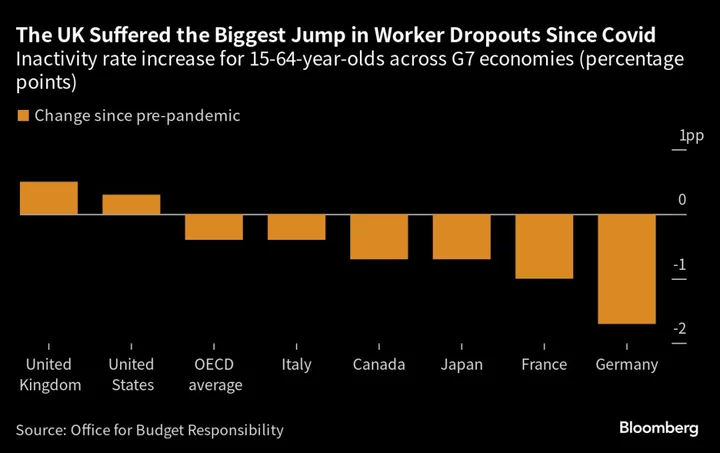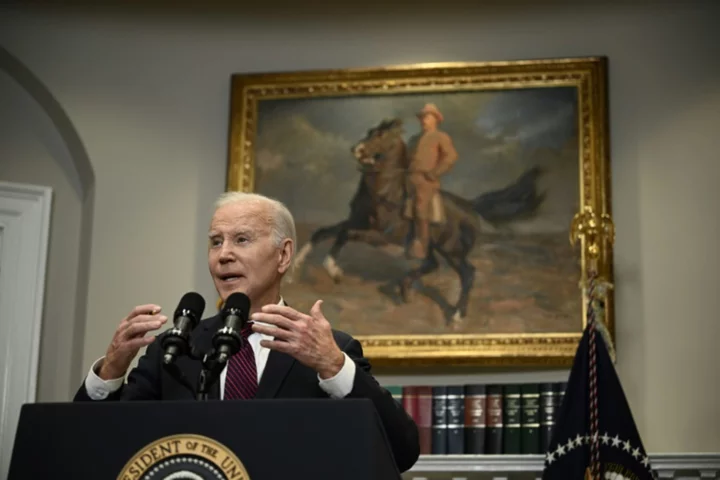Deteriorating health in Britain is costing the state more than £15 billion ($19.6 billion) a year in higher benefits and lost taxes, the Office for Budget Responsibility found in a report that adds urgency for sweeping government action.
The Treasury’s budget watchdog found that part of the surge in costs over the past three years may have been due to the relative generosity of the benefit system for health conditions, which encourages people to claim higher benefits.
The conclusion adds to the sense of crisis in the National Health Service, where junior doctors walked off the job this week demanding higher pay and waiting lists for patient to receive treatment hit another record. The OBR’s report set out a number of budget pressures from rising worklessness to the need for higher defense spending, which are constraints on Prime Minister Rishi Sunak’s government to shovel money at NHS problems.
“The health legacy of a health crisis in the midst of a cost of living crisis will is likely to make people look very carefully at what they may be eligible for within the welfare system,” Andy King, a senior official at the OBR, said at a briefing in London on Thursday.
The OBR assessed the damage to the UK economy and public finances from a leap in the number of people dropping out of the workforce since the pandemic. Britain’s increase in economic inactivity — where people are out of work and not looking for a job — is unique among Group of Seven nations.
The UK is grappling with acute worker shortages which have resulted in labor hoarding and pay rises that are pushing up inflation. Employment has only recently recovered to pre-pandemic levels, a far slower rebound than all other major advanced economies. And the benefits system may be partly to blame.
“Rising onflows to health-related benefits may partly reflect … the role of a sustained period of weak household income growth and rising cost-of-living pressures increasing the incentives to claim the more generous benefits,” the OBR said in its report.
A separate analysis released Thursday suggested the Treasury system of one-off payments to help families cope with the cost-of-living squeeze has added to the problem.The Institute for Fiscal Studies said £19 billion over the next two years isn’t well targeted. That may be distorting incentives for people to work.
“Families that are on benefits are really in for a roller-coaster as their incomes are changing in quite arbitrary ways at the time because of the lag in the measure,” Xiaowei Xu, a senior economist at the IFS, said on Bloomberg Radio.
Sunak is addressing the issues on a number of fronts. He backed recomendations to boost pay across the public sector, hoping that will bring an end to strikes especially in the NHS. He’s also assessing ways to prod more people back into the labor market.
The issue is putting huge strains on the public finances, which are buckling under high interest rates and inflation. The £15.7 billion cost in lost taxes and higher welfare costs is comparable to raising the basic rate of income tax from 20% to 23%.
Record National Health Service waiting lists have been cited as a potential cause of worker shortages, but the OBR said they have had a minimal impact.
“Halving the NHS waiting list over five years would only reduce working-age inactivity by around 25,000,” it said.
Since the pandemic, health related inactivity has risen by around 400,000 to 2.6 million — 6.1% of the working-age population “making this group, for the first time, the single-largest segment of the economically inactive population.”
Of the post pandemic increase, the OBR said:
- Half are aged 50 to 64
- Half are suffering from mental health problems or other unspecified conditions
- Three fifths are relatively low skilled
- Many previously worked in lower-paid, customer-facing service industries
The fall in employment or working hours related to the rise in health-related problems since 2020 will cost £8.9 billion in foregone taxes this year, the OBR estimated. The increase in spending on health-related benefits is an further £6.8 billion cost on the state. Strains on the NHS drive up costs.
“We estimate that each individual moving into health-related inactivity costs the NHS between £900 and £1,800 a year, as well as precipitating further costs in future given the well-documented negative effect of worklessness on people’s health,” the OBR said.
Read more:
- England’s Junior Doctors Begin Longest Strike in NHS History
- Sunak Dealt Another Blow on NHS as Waiting Lists Rise Again
- Sunak Signs Off on Pay Recommendations for Public Sector Workers
- Hot UK Wage Data Keeps Spotlight on Bank of England Rate Hikes
- UK Unemployment Up at Record Pace in Sign of Cooler Jobs Market
--With assistance from Tom Rees, Jill Namatsi, Ellen Milligan and Emily Ashton.
(Updates with context on strikes and pay deal)









